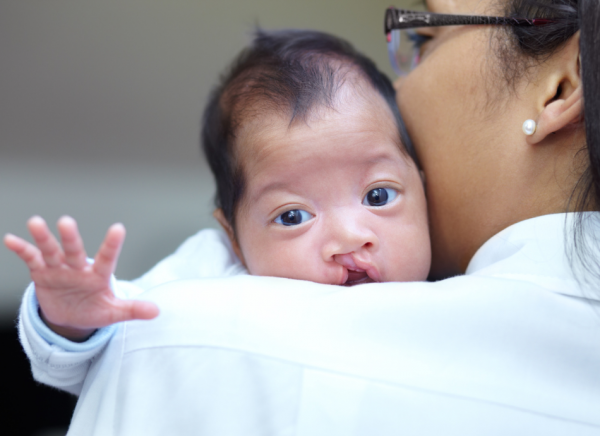If you're a frequent visitor to Healthify, why not share our site with a friend? Don't forget you can also browse Healthify without using your phone data.
Birth differences
Key points about birth differences
- About 5% (one in 20) of babies/pēpi born in Aotearoa New Zealand have a birth difference. Some of these are minor and some are more serious.
- Some differences are found during pregnancy, while others are not found until after the baby is born.
- Many birth differences can't be prevented but there are things you can do to increase your chances of having a healthy baby.
- Factors that can increase your chance of having a baby with birth differences include not taking folic acid, drinking alcohol, smoking cigarettes, illicit drug use, some medications, infection, obesity and pre-pregnancy diabetes.

A birth difference is something that is present at birth. It occurs when a baby is developing in the womb. Most birth differences happen in the first 3 months of pregnancy because that's when the baby's organs are developing.
A birth difference may affect the way the body looks, works or both. Some birth differences (eg, cleft lip) are easy to see, but others (eg, hearing loss) are found using special tests. Birth differences can vary from mild to severe.
If your baby is born with a birth difference or other health condition, they may need special care at birth and later in life. You will be able to talk to your baby’s healthcare team about any questions or concerns you have.
A child born with a birth difference can still lead a normal and healthy life. Although these children may have challenges that other people don’t have, they can still do everything most other people do.
Researchers have identified thousands of different birth differences, but some are much more common than others. There are 2 main categories of birth differences: structural (how the body is formed) and functional (how the body works). In some cases, birth differences are caused by a combination of factors, leading to both structural and functional challenges,
Structural birth differences
Structural birth defects relate to problems with how part of the body is formed. Some of the more common or serious problems include:
- cleft lip or cleft palate
- congenital heart disease such as missing or misshaped valves
- limb differences, such as a clubfoot
- neural tube defects, such as spina bifida, anencephaly or other problems related to the growth and development of the brain and spinal cord.

Image credit: Canva
Functional birth differences
Functional, or developmental, birth differences are related to a problem with how a body part or body system works. They can lead to intellectual and developmental disability and can include:
- nervous system or brain problems, such as Down syndrome and Prader-Willi syndrome
- sensory problems, such as blindness or deafness – see hearing loss in babies and children
- metabolic disorders – problems with certain chemical reactions in the body, such phenylketonuria and hypothyroidism
- degenerative disorders – these conditions might not be noticeable when your baby is born, but can get worse over time, for example, muscular dystrophy.
For many birth differences, the cause is unknown. However, they may be due to one of the following causes:
- Genetics – one or more genes might have a change or mutation that results in them not working properly, as in cystic fibrosis.
- Chromosomal problems – a chromosome or part of a chromosome might be missing or there may be an extra chromosome, as in Down syndrome.
- Not getting enough of certain nutrients, such as folic acid. Taking folic acid before and during pregnancy is a key factor for preventing neural tube defects.
- Exposure to harmful substances such as alcohol, cigarettes or certain medicines.
- Infections during pregnancy, such as rubella or cytomegalovirus (CMV).
Many birth differences can't be prevented. However, you can increase your chances of having a healthy baby by adopting a healthy lifestyle and managing health conditions before you become pregnant.
The following factors increase your chance of having a baby with a birth difference:
- Lack of folic acid.
- Drinking alcohol while you're pregnant.
- Smoking cigarettes.
- Taking some medications during pregnancy – many medications can be taken safely in pregnancy, but it's important to check before you take medications. Don’t stop regular medications without discussing it with your healthcare provider.
- Some infections such as cytomegalovirus (CMV).
- Obesity.
- Poorly controlled diabetes.
- Increasing age of the mother.
If you're planning to become pregnant, make a PACT with yourself to take the following actions:
- Plan ahead and take 800mcg of folic acid every day for at least 1 month before you get pregnant until 12 weeks into your pregnancy. This can help reduce your chance of having a baby with spina bifida. If you have a body mass index (BMI) of over 30, a family or personal history of neural tube defects or diabetes you should take 5 mg of folic acid each day. Read more about taking folic acid during pregnancy.
- Avoid harmful substances, including alcohol, cigarettes and other drugs, and food-borne bugs. These can all cause complications in pregnancy and birth differences. Read more about alcohol and pregnancy and smoking and pregnancy.
- Choose a healthy lifestyle – try to achieve and maintain a healthy weight and keep diabetes under control. Obesity and poor diabetes control increases the chance of birth differences and other problems in pregnancy. Read more about eating, drinking and watching your weight in pregnancy and pre-existing diabetes and pregnancy.
- Talk to your healthcare provider about any medications you're taking and any vaccinations you may need. Some medications can cause serious birth defects if they're taken during pregnancy. Most vaccinations are safe during pregnancy and some vaccinations, such as the flu vaccine and COVID-19 vaccine, are specifically recommended during pregnancy. Read more about pregnancy and immunisation.
Apps reviewed by Healthify
You may find it useful to look at some pregnancy, baby care and parenting apps, alcohol use apps and quit smoking apps.
Pregnancy and newborn screening(external link) National Screening Unit, NZ
Birth defects and your baby(external link) March of Dimes, US
Specific birth defects(external link) Centers for Disease Control and Prevention, US
Resources
Alcohol and pregnancy – what you might not know(external link) HealthEd, NZ
Apps
Pregnancy, baby care and parenting apps
Alcohol use apps
Quit smoking apps
References
- Birth defects(external link) Medline Plus
- Birth defects(external link) CDC, US, 2024
- Congenital anomalies(external link) National Institute of Child Health and Development, US, 2023
- New Zealand Congenital Anomalies Registry (external link)NZCAR
- Wāhi Rua – New Zealand Maternal Fetal Medicine Network(external link)
Clinical guidelines
Observation of mother and baby in the immediate postnatal period – consensus statements guiding practice(external link) Ministry of Health, NZ, 2012
Neural tube defects – management of infant(external link) Starship, NZ, 2017
Preconception care in general practice(external link) BPAC, NZ, 2011
Organisations
NZ Foetal Medicine Network
The New Zealand Foetal Medicine Network(external link) supports the management of women with high-risk pregnancies including those with fetal anomalies. The network provides information for parents and health professionals regarding the antenatal management of high-risk pregnancies within New Zealand. There are 3 hubs managing referrals, clinical questions and queries based in Auckland(external link), Wellington(external link) and Christchurch(external link).
They also have a range of downloadable recommendations of practice.(external link)
Genetic Health Services NZ
The Genetic Health Services New Zealand provides expert genetic advice, counselling and diagnostic services to patients and health professionals. Find out more about the service they provide.(external link)
For further information on investigating specific genetic disorders see The New Zealand laboratory schedule tests and guidelines – genetic tests.(external link)
The NZ Congenital Anomalies Registry(external link)
NZCAR is funded under a contract with the Ministry of Health.
Credits: Healthify editorial team. Healthify is brought to you by Health Navigator Charitable Trust.
Reviewed by: Dr Judy Ormandy, Senior Lecturer in Obstetrics, Gynaecology & Women’s Health, University of Otago, Wellington and Obstetrician & Gynaecologist, Health New Zealand | Te Whatu Ora, Capital, Coast & Hutt Valley
Last reviewed:





